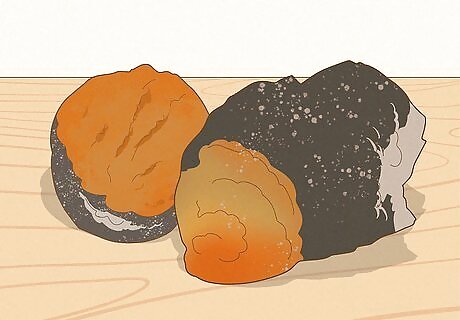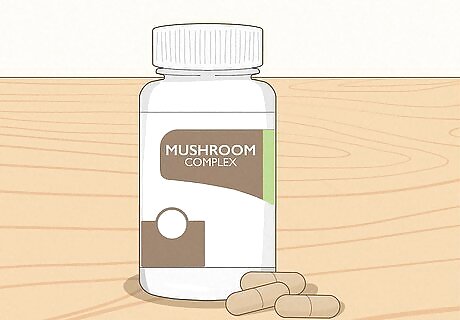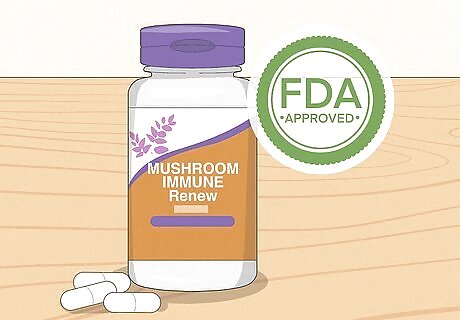
views
- Functional mushrooms are fungi that are believed to have health benefits beyond their nutritional value. They also contain adaptogens, which help fight off stress.
- Types of functional mushrooms include reishi, chaga, cordyceps, lion’s mane, shiitake, turkey tail, and tremella.
- Add lion’s mane or shiitake to your favorite pasta or traditional mushroom dishes. Other mushrooms can be steeped in tea or purchased as coffee.
What are functional mushrooms?

Functional mushrooms are fungi that may have health benefits. Functional medicine advocates believe that these mushrooms have properties beyond their basic nutrition that can be beneficial to your health. Functional mushrooms include adaptogens, which help the body fight off chemical, biological, and physical stress. Functional mushrooms don’t include psychedelic fungi, which can cause mind-altering effects like hallucinations. Adaptogens can reduce or increase your cortisol levels to return your body to a state of balance. Other common adaptogenic plants include American and Asian ginseng, ashwagandha, eleuthero, and rhodiola.
Types of Functional Mushrooms

Reishi Also called the “divine mushroom” or “mushroom of immortality,” the reishi mushroom is best known for its anti-inflammatory and antioxidant properties and its ability to boost the immune system. They’re rigid and tough, so they aren’t typically used in cooking. Instead, they’re used in pills, teas, syrups, rice wine, and hair and skin products. Potential Benefits: Besides reducing inflammation and boosting immunity, they may also relieve arthritis, mood disorders, liver disease, and even cancer. Some studies have found that ingesting reishi mushrooms can cause insomnia and nausea.

Chaga Found on birch trees in colder climates, Chaga mushrooms are chock-full of antioxidants and have been used throughout history to boost immunity. With a bitter vanilla taste, Chaga mushrooms can be a great addition to a coffee or tea. Potential Benefits: Reduce inflammation, fight cancer, and lower blood sugar and cholesterol. One study found that Chaga mushroom supplements reduced tumor sizes by 60% in mice. Another found that it helped prevent the growth of cancer cells in the liver. If you have type 2 diabetes or take a blood-thinning medication, talk to your doctor before adding Chaga mushrooms to your diet.

Cordyceps Cordyceps mushrooms are found all over the world, infecting and growing out of insects like parasites. Cordyceps have long been used for its anti-fatigue, anti-aging, and anti-cancer properties that may help improve energy levels, sex drive, and heart health. Potential Benefits: A few small studies on animals found they may increase fitness levels, decrease inflammation, regulate blood sugar, regulate energy metabolism, and block the spread of some cancers. Some cordyceps species have also been used for the treatment of and protection against liver and kidney diseases. If you have type 2 diabetes, take any blood thinners, or have an autoimmune disorder like fibromyalgia or multiple sclerosis, you might want to avoid taking cordyceps.

Lion’s Mane The lion’s mane mushroom, known for its earthy and seafood-like taste, can be found in supplement-form and is often used in cooking as a vegan alternative to crab or lobster. They’re often sought-out for their amazing ability to boost brain, heart, and immune system health. Potential Benefits: Promote gastrointestinal health and improve cognitive function. These mushrooms might also be anti-inflammatory and antioxidative. One study even found that lion’s mane mushrooms could help repair nerve damage in rats. Another small study suggests that these mushrooms might reduce feelings of stress, however, more research is needed to prove this benefit.

Shiitake Shiitake mushrooms are prized for their chewy, earthy umami flavor. They’re also the second-most cultivated mushroom in the world because of their health benefits and high content of fiber, proteins, amino acids, vitamins, and minerals. Potential Benefits: Keep cholesterol levels low, reduce risk of mild cognitive impairment, decrease the risk of cancer, and support a healthy immune system.

Turkey tail Turkey tail mushrooms, named for their resemblance to ringed turkey tail feathers, can be found on dead tree logs worldwide. These woody mushrooms have strong antioxidants and are commonly consumed in tea or supplement capsules. Potential Benefits: Boost the entire immune system and reduce inflammation. They may be most beneficial for cancer patients going through radiation therapy and/or chemotherapy. While turkey tail mushrooms are generally safe to consume, it’s best to talk to your doctor before using them.

Tremella Tremella (or “snow”) mushrooms are edible seaweed-like fungi that grow in tropical regions around the world. These mushrooms are commonly found in supplement form and are often used in skin products as a moisturizing, anti-radiation, and anti-aging ingredient. Potential Benefits: May moisturize the skin, protect against UV rays, and reduce the effects of aging. They can also be used as a treatment for some skin conditions. Although further research is needed, some studies have found that tremella mushrooms may improve short-term memory and help prevent neurodegenerative diseases like Alzheimer’s.
How to Consume Functional Mushrooms Safely

Check with your doctor before taking mushroom supplements. Some herbal and fungal supplements might come with side effects, especially when taken before surgery or with other medications. Your doctor can help you manage your care and properly integrate these supplements into your diet. Functional mushrooms are generally safe for most people to consume. However, if you’re taking blood thinners, blood pressure medication, or diabetes medication, talk to your doctor first. Most of these mushroom supplements have not been tested to see how they interact with other medicines, foods, or supplements. People who are pregnant or breastfeeding should also avoid reishi mushrooms because more research is needed to see if they’re safe.

Choose a mushroom that targets a specific health problem. After talking to your doctor and taking into account any existing medical conditions, choose a mushroom that aligns with your goals. For example, if you’re worried about mild cognitive impairment, you might incorporate lion’s mane or shiitake mushrooms into your diet. Try to avoid taking functional mushrooms instead of seeking help from your health provider. Supplements are not meant to replace the help of medicine but work in conjunction with it.

Look for third-party certifications on mushroom products. Functional mushrooms are considered dietary supplements, which are monitored by the Food and Drug Administration (FDA) as food products (not drugs). This means supplements that aren’t safe, don’t have health benefits, or include other ingredients can be sold. Look for products labeled certified by NSF, USP, UL, or ConsumerLab.com. NSF International: A nonprofit organization that offers two kinds of certifications: NSF Contents Certified and NSF Certified for Sport. U.S. Pharmacopeia (USP): A nonprofit organization that sets some of the most widely accepted standards for supplements. UL Solutions: A for-profit company known for testing electronics that also tests and certifies supplements. ConsumerLab.com: A for-profit company that regularly tests and certifies supplements. Dietary supplements are also not FDA-approved to treat, diagnose, prevent, or cure diseases. If a supplement promises a cure, it’s probably too good to be true.

Incorporate mushrooms or supplements consistently into your diet. Functional mushrooms don’t provide immediate, noticeable benefits from just one dose, but can be beneficial when you take them consistently over a long period. Take 1,000 to 2,000 mg of a functional mushroom every day to get the most out of these fantastic fungi. It can take 2 weeks to notice the effects of functional mushrooms, and some experts recommend taking a week off every 4 to 6 months. Researchers have also found that incorporating 2 medium mushrooms of any variety into your daily diet can lower your risk of cancer by as much as 45%.
How to Add Functional Mushrooms into Your Dishes

Add edible mushrooms to sauces, pasta, and classic mushroom dishes. Classical functional mushrooms like lion’s mane or shiitake can also be sautéed, stuffed, added into risottos, or steeped to make mushroom stock. Before tossing mushrooms into your dishes, consider each one’s unique taste and texture and think about if it’ll work with the other ingredients. Cook other mushrooms, like oyster, maitake, white button, king oyster, crimini, portabella, or golden mushrooms to add extra nutrients to your meals. Some mushrooms have a similar taste and texture profile to meat, so you can also blend them with meat or eat them as a meat replacement.

Use tough functional mushrooms in your tea or coffee. Mushrooms like chaga, lion’s mane, or turkey tail can be added as ingredients in your tea. To add it to tea, steep a 1 inch (2.5 cm) piece of dried mushroom in 1 US quart (0.95 L) of water for at least 8 hours. You can also purchase mushroom coffee grounds, packets, or pods. If you have a supplement form, try blending it into a smoothie, mixing it into coffee, or sprinkling it over your salad or oatmeal. The mushrooms in mushroom coffee go through a drying and extraction process to pull out the beneficial compounds, which then get mixed into regular coffee grounds. The most popular mushrooms found in these blends include reishi, chaga, lion’s mane, and cordyceps.




















Comments
0 comment